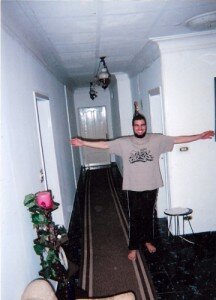
Tarek Mehanna (photo courtesy Mehanna family)
Government prosecutors claimed that Tarek Mehanna was the type of person that would contemplate killing Americans as they shopped at the mall. But for every day of Mehanna’s eight-week trial, the courtroom was filled with supporters from the mainstream Muslim community here in Massachusetts. They spoke about the Mehanna they knew. A passionate and caring teacher at the local mosque. A dedicated scholar of Islam who shared his passion for arcane texts. A pharmacist who had landed a job at Saudi Arabia’s top hospital before being arrested. They accused law enforcement of targeting an upstanding member of the Muslim community for speaking his mind about America’s wars in the Middle East.
This was more than just a difference in perception. The Mehanna case represented a fundamental departure from the hundreds of domestic terrorism prosecutions in post–September 11 America. Mehanna had not been caught buying weapons from an FBI informant or parking a car bomb in Times Square. The crimes he was charged with centered on what he said and wrote—and why. Mehanna, according to the government, was part of the “media wing of al-Qaeda.” Prosecutors claimed he had lived a “double life”: a “dutiful and scholarly man” whose true self was “angry, callous, and calculating.” They argued that Mehanna’s intent was to inspire jihad through his keyboard—and that, they asserted, made his translations a crime.
But Mehanna never participated in or planned a terrorist act. He never knowingly communicated with terrorists. This was precisely the kind of case that civil libertarians had been warning about since the Patriot Act was passed in 2001. Because of a thin thread linking Mehanna’s translations to al-Qaeda, the government was asserting that the First Amendment did not protect his speech. The case raised, in a new way, the specter of how far the government will go in prosecuting citizens under the guise of keeping us safe. When does political speech cross the line into support for terrorism?
Read more at The American Prospect. I also reported the story for Latitude News and PRI’s The World.
Comments on this entry are closed.